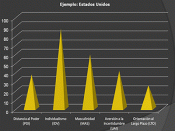What do you make of Hofstede's cultural dimensions? Do you find them to be a useful tool in International Business?
Between 1967 and 1973 Professor Geert Hofstede surveyed over 100,000 IBM employees in 49 different countries about their preferences in terms of work-related values. The result was a number of seminal works on cultural values and differences published during the 1980s and 1990s. These results have had a profound influence on the field and practice of international management. The affect of the Hofstede's cultural dimensions - Power Distance, Uncertainty Avoidance, Masculine/Femininity and Individual/Collectivism on organizational behavior shows up in all cultures and cross cultures.
Power Distance Index (PDI) focuses on the degree of equality, or inequality, between people in a country's society. A High Power Distance ranking indicates that inequalities of power and wealth have been allowed to grow within the society. These societies are more likely to follow a social group system that does not allow significant upward mobility of its citizens.
Example countries include Philippines, Mexico, Venezuela, India and Brazil (Shenkar, Luo, 2004, Exhibit 6-6). A Low Power Distance ranking indicates the society de-emphasizes the differences between citizen's power and wealth. In these societies equality and opportunity for everyone is stressed. Examples countries include Austria, Israel, Denmark, Sweden, Norway (Shenkar, Luo, 2004, Exhibit 6-6).
With power distance, when dealing with other cultures, you have to adapt one's company values to that of the society in which you live and the people that you employ and the public that you deal with. In organizational behavior you have to be able to adapt or willingly participate and follow through on those culture beliefs of society. "Your management structure has to follow the structure of that society while understanding uncertainty avoidance knowing that certain cultures like to have rules stressed, want...


